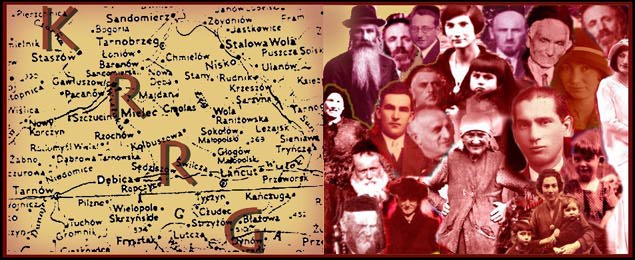


Tyczyn, my shtetl Tyczyn, the little town where my home was, where my family lived, where I have spent my childhood years…
By George Salton
Tyczyn, where I lived with my parents and my older brother was a typical, small Polish town. Tyczyn had an elementary school and a court, but the high school, county court, railroad station, good restaurants and movie houses were in Rzeszow. About four thousand people lived in Tyczyn, about one third of them Jewish. Except for the high school students, who in good weather preferred to ride their bikes, most town people traveled the few miles between Tyczyn and Rzeszow by the local bus. The local farmers made the trip in their horse-drawn wagons and the poor walked.
Tyczyn’s central market square located on top of a small hill, was surrounded by undersized houses and little stores owned mostly by Jews. Their customers were the townspeople and the farmers from the nearby villages. Here one could buy tobacco, groceries, school supplies, textiles, clothing, hardware, ice cream or liquor. A severe looking city hall, built during Austrian times, faced the square from its southern side. On the streets behind the city hall were the town’s one church, the elementary school and the town’s fire station. The doctors’ office was located on the opposite side of the square, next to the two-story building owned by the Tuchmans. Behind the Tuchman’s house, on a narrow, crooked street stood our old, large gray-stone synagogue. Next to it stood a smaller red brick Jewish House of Prayer. Clustered around them were small, mostly wooden houses of the poorer Jews.
On the few narrow streets spreading from the market square, other families, both Catholic and Jewish, lived in small, modest houses. Here and there stood a few larger brick houses, belonging to the few richer families. Further out, in all directions, were small gardens and orchards and the beginnings of farms. The river Stryj was not far away. For the young boys it was convenient for swimming and for fishing.
I am sure that a visitor from a larger city would see Tyczyn for what it was: a small, old town without modern amenities, without a hospital, a library, a good restaurant or a hotel, without adequate shopping, or even a bank. But what made Tyczyn special for me as I was growing up was its very smallness. For I knew every street and almost all of its people.
The majority of Tyczyn Jews, were poor or of only modest means. Some owned small stores, others were tailors or shoemakers, and still others made their livelihood by selling and buying things in the nearby villages. A few were professionals: a doctor, a pharmacist, and a few lawyers like father, Dr. Henry Salzman. Most of the Jews were observant and religious. Access to secular education and the ever wider acceptance of Zionism, may have brought changes to the texture of the Jewish community but did not affect its fundamental values.
Tyczyn had two synagogues: a large, old, gray-stone synagogue and mid-sized red brick synagogues next to it. Different groups attended the two synagogues, I remember hearing that they were followers of different Rabbis. My family attended the large synagogue.
Jewish cemetery in Tyczyn was used by the Jews of Tyczyn as well as Jews from the nearby villages.
Saturdays were special days in Tyczyn. On Friday, Jewish women were busy preparing for the Shabbat. Jewish shops and stores were closed early. Those selling or buying in the nearby villages came back to town. Men rushed home. In every Jewish house, even the poorest, a special meal was served and candles were lit. Then grandfathers and fathers and their young sons, wearing their best clothing, went to the synagogue for the evening services. The town was small and for everyone the synagogue was within walking distance. Saturday was day of prayers and rest in the Jewish community. People attended the synagogue and then spend time with their families.
Our life in Tyczyn was unfortunately not filled only with tranquility and piety. Some of our Christian townspeople were viciously anti-Semitic and there always incidents of some Jews being assaulted on the street or of windows of some Jewish homes being smashed. Christmas evening and Easter were for some reason most unsafe for us and on those days we tended to stay homes with our doors locked..
The majority of Tyczyn Jews, were poor or of only modest means. Some owned small stores, others were tailors or shoemakers, and still others made their livelihood by selling and buying things in the nearby villages. A few were professionals: a doctor, a pharmacist, and a few lawyers like father, Dr. Henry Salzman. Most of the Jews were observant and religious. Access to secular education and the ever wider acceptance of Zionism, may have brought changes to the texture of the Jewish community but did not affect its fundamental values.
In 1994 and in 1998 I went back to see Tyczyn. The town is still small with crooked streets and little houses. But strangers now live in those houses and no one seems to care about or remember the Jews of Tyczyn. There is no signs left of our synagogues and most townspeople don’t even know that there were once synagogues in their town. The old Jewish cemetery is still there, locked, overgrown and neglected. Tyczyn has now a Website on the Internet that describes the town, its sights and its history but makes no mention at all of the fact that there were Jews living in Tyczyn for hundreds of years and that they were all driven out and murdered.
It is up to us now to remember them.
February 2002
© Copyright 2017 Kolbuszowa Region Research Group. All rights reserved.